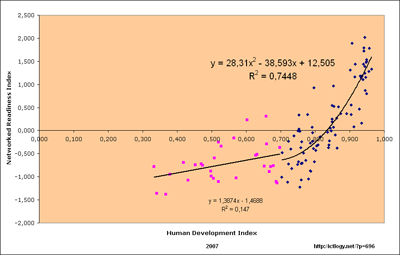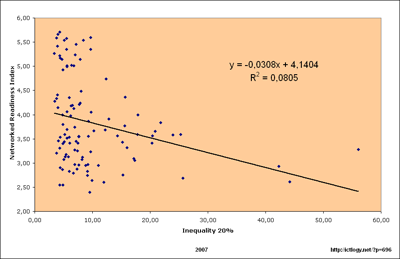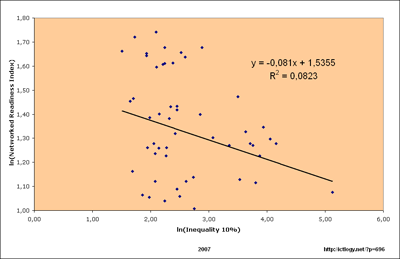By Ismael Peña-López (@ictlogist), 27 March 2008
Main categories: Digital Divide, Digital Literacy, ICT4D, Participation, Engagement, Use, Activism
Other tags: actor_network_theory, ethnography, research, telecenter, telecentre
No Comments »
Daniela de Carvalho Matielo presents a PhD seminar at the Internet Interdisciplinary Institute, UOC.
Challenging the digital divide: the role of telecenters in e-inclusion practices.
First, Daniela brings a short introduction to the concept of the Digital Divide as lack of access to ICTs.
Digital Inclusion is then the effort to guarantee everyone has access to the Information Society.
The problem is that there is not only one digital divide, but many: geographical, etc.
These efforts have, hence, many designs, from fiscal incentives to direct provision of Internet access from physical places: telecenters, places people can go to use telecommunication services. The main difference with a cyber cafe is profit — in the latter case — or bridging the digital divide — in the fomer case —.
Three moments of digital inclusion (according to Warschauer):
- Device model: physical access
- Connexion model: access to the Network
- Literacy model: uses and contexts
A shift is now taking place towards a more social-aspects focused strategy:
- What are the main competences to use the computer: digital literacy
- What are the uses that certain communities can give to computers and the Internet: technology appropriation
But it seems that this shift has gone from “technological determinism” to “social determinism”, from an approach where technology would solve each and every problem (cyberoptimism) where just everything can be solved inside the “black box” of the community.
But, technologies are not neutral and the actor-network theory (ANT) can bring some light to the issue.
What do we have so far?
- Official reports about telecenter use and users
- Scientific studies, both qualitative and quantitative
“Community Informatics” is a field whose goal is to analyze the uses of ICTs in communities.
Research Questions / Hypotheses
- Technology plays an important role. This role is usually neglected at higher levels.
- There is a big differnetce between practice and goals in telecenters as stated in their official discourses
Following the ANT, there’s an interaction — chains of association — between users and technologies so, after passing through a “black box”, become from digital illiterate to literate, and from technologies to properly appropriated technologies.
The methodology to be used in this research will be, based on the ANT, do an ethnography in a telecenter to disclose the relationships of technology appropriation by users.
Comments
- Several persons in the audience state that ANT might not be the best approach, as it takes for granted that there is a role performed by technologies, and a relationship technology-user, which is exactly what the research wants to find.
- I state that this could be balanced (theory vs. practice, positivism vs. normativism) by balancing ANT with a participatory action research instead of performing an ethnography.
- Somebody also points that it would be interesting to see how digital literacy (strictly personal) can be complemented with technology socialization, so a social framework is created through technology, so the digital literate can then interact “technologically” with others, and socialize.
By Ismael Peña-López (@ictlogist), 18 March 2008
Main categories: Digital Divide, e-Readiness, ICT4D
3 Comments »
Two years ago we here spoke about e-Readiness and the Human Development Index. The chart we then plotted was similar to this one:
This chart now adds two tendency curves: one (exponential) for countries with a Human Development Index (HDI) over 7.00, and another one (linear, though absolutely irrelevant, on the other hand) for countries under 7.00 — though there are lots of countries missing: too poor to appear on the charts…).
Even if the regression is not really accurate (not at all) we can more or less see a relationship between e-Readiness and Development (as measured as HDI).
One of the main criticisms I have against how the digital divide, the Information Society or e-Readiness is measured (see below “More info” for a couple of references) is that it either takes one of the following paths:
- Focus almost exclusive on infrastructures
- A too broad approach thus including “analogue noise” (i.e. non-digital indicators or analogue economy indicators — provided such a thing makes sense, which I believe it does in the field of development)
In any case, huge voids appear: digital literacy levels, the regulation framework and richness of content and e-services.
Are these lacks relevant?
Let’s take a look at the measurement of Inequality (from the HDI database, calculated after the World Bank’s World Development Indicators), comparing the ratio of 20% richest ones to 20% poorest ones, and ratio of 10% richest ones to 10% poorest ones. And we chart it against the year 2007 World Economic Forum’s Networked Readiness Index (we plot the second one logarithmically, just for a change):
As can be easily seen in both comparisons — linear for the 20% to 20% inequality; logarithmically for the 10% to 10% inequality — there does not seem to be any kind of relationship between e-Readiness and Inequality. But whose problem is this? the reality’s or our models’? Does it really make sense that a country with highest inequalities can be as e-ready as another one with a more balanced income/wealth distribution?
It is no news that income inequalities carry on associated inequalities in education, in political stability, social and community engagement, security and crime, etc. So, can a society with low/uneven human capital, political instability, poor community engagement, high crime rates… be as e-ready as another one with better scores in these indicators? Intuition clearly and loudly shouts no, not at all, by any means.
Then, where’s the problem? In my opinion, it undoubtedly is in how we measure how good our degree of Information Society development is.
And, if so, where are we failing? I guess here are some places to look at:
- We pay too much attention to infrastructures. They are needed, of course, but they are means, not ends. ICT infrastructures should be seen as a necessary condition for ICT development, but not as a sufficient condition.
- We quite always forget about digital literacy, getting rid of it with a simple “number of Internet/PC/mobile phone users” indicator, an indicator which does not measure how different uses can leverage ICTs for development.
- Even if we approach digital literacy, aggregate measures do not discriminate between different users and the individual benefits they get, or how their different levels of skills impact on their productivity or their employability.
- At the aggregate level, it is easy that big firms’ ICT achievements and Governments’ big investments overshadow poor ICT adoption and performance by SMEs, thus provoking a paradox: at the aggregate level, ICT investment and consumption is great, but “no one” is using them (a reframing of Solow paradox?).
- Our knowledge on how ICTs affect social parameters — out of the Economy arena — is way too poor. So, we are having tough times to incorporate such parameters in our e-Readiness models and indices. Does e-Administration, e-Government and e-Democracy matter? At what level? Does ICT skills matter in multi-factor productivity? At what level? Can this be included in our models?
Put short: I guess we are missing people in our models. I am not saying it is easy to do, but we are actually missing the key.
More info
By Ismael Peña-López (@ictlogist), 03 March 2008
Main categories: Digital Divide, Digital Literacy, e-Readiness, ICT4D
3 Comments »
In a recent event where I was invited to debate about the need whether to foster the Information Society, I was shocked about some positions from both some of the speakers on the round table I participated in and the audience.
The starting point was: is there a need to foster the Information Society, or the Web 2.0 is a sufficient empowerer so there’s no reason to set up centralized strategies and policies?
One of the first arguments to come to debate can be summed up by “if people find no interest on the Internet, they will not use it, even if the infrastructures are ready and affordability is good enough”.Which I absolutely share: people like Lenhart (2000), Compaine (2001) or Parks Associates (2007) have already given evidence about this fact — this is, of course, especially relevant in developed countries, but it is also true in the poorest parts of them, so extrapolation to developing ones could be possible.
The next argument comes straightforward: we cannot force anyone to enter the Information Age. Again, I agree.
Disagreement comes with the next statement, primarily defended by the political representatives in the room: neither should we force anyone to enter the Information Age nor should we try to convince them to. Otherwise, we would be patronizing them, being paternalistic and acting like enlightened elites, and so on. We have to stop being cyberoptimists: people know better than anyone what their needs are, if people just want to share their photos, the only thing we [the government] have to do is to offer [subsidized] Flickr courses for anyone
.
The argument is: don’t trust the doctor, because he’s being an enlightened elite prescribing antibiotics for your infection (not trying to save your life); don’t trust anyone that tells you to fix your roof, because he’s being paternalistic and patronizing (not just giving advice against it collapsing with the next rain).
The evidence of the economic impact of ICTs is great and growing. And there is plenty of people out there doing research about the issue. Elites? Not at all: people (scholars, politicians and experts in general) whose job (they are paid for it) is to give advice i.e. on the consequences on the job market of being digitally literate… or illiterate. You can disagree on interpretations, but not on data.
Honestly, I think that, these days, the difference between cyberoptimists and cyberskeptics is tiny:
- Cyberoptimists will tell you that there’s plenty of evidence of the coming of age of the Information Society and that the potential possibilities are many
- Cyberskeptics will tell you that there’s no evidence of huge benefits of entering the Information Society, but will agree that there are huge losses of not doing it (i.e. you might not increase your productivity being digitally literate, but you’ll surely loose it if you’re not)
The rest of the story is about swindlers and cyberblind. Yours to choose.




